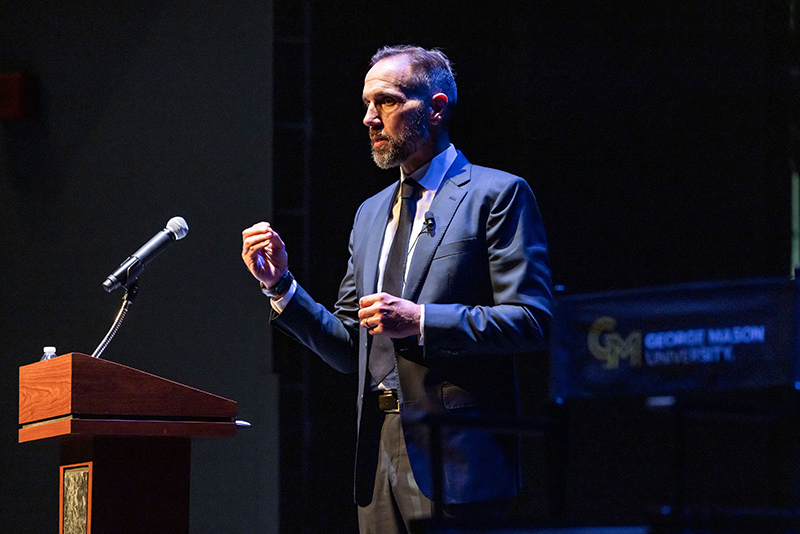In This Story

Veteran corruption prosecutor Jack Smith, speaking September 16 at George Mason University’s annual Wilkins Lecture, presented overwhelming evidence that the rule of law in the United States is under serious threat. The former Department of Justice special counsel worked the Harris Theatre auditorium like a courtroom of 450 jurors, defining legal terms, citing testimony, identifying culprits, and presenting possible remedies.
The verdict was a standing ovation.
Smith, who was appointed in 2022 to investigate two major criminal charges against former President Donald Trump, delivered a riveting September 16 Wilkins Lecture called “Democracy, Integrity, and the Rule of Law.” A capacity audience of students, faculty, staff, and community members braved an ill-timed tropical storm to witness the lecture at George Mason University’s Fairfax Campus’ theater.
Smith, whose career in public service includes time as assistant and acting U.S. attorney in the Department of Justice and head of the department’s Public Integrity Section, as well as chief prosecutor at the Kosovo Specialist Chambers, an international tribunal at The Hague that investigated and prosecuted war crimes in the Kosovo War. He served as a Special Counsel for the Department of Justice from November 18, 2022 until January 10 of this year.
A capacity audience of students, faculty, staff, and community members attended his talk “Democracy, Integrity, and the Rule of Law.” The annual Wilkins Lecture is cosponsored by the Philosophy, Politics, and Economics Program and the Schar School of Policy and Government.
After an introduction by George Mason Robinson Professor Spencer Crew, Smith began the lecture by saying how he admired the widely revered Roger Wilkins, a pioneering assistant attorney general, Pulitzer Prize-winning journalist, and longtime George Mason academic, for whom the lecture is named.
Smith promised he would not talk about politics, though he did have much praise for his former colleagues and employer.
“What I see happening at the Department of Justice today saddens me and angers me. Selfless public servants fired for doing their job; the government, using the vast powers of the criminal justice system to target citizens for exercising their constitutional rights—the civil rights and civil liberties that people like Roger Wilkins fought for under attack.”
The rule of law, “an important aspect of our lives in this country,” he said, is tenuous.
“My career has also shown me how fragile it can be, much more fragile than we might think,” he said. “As an international prosecutor, I have seen in other countries the rule of law erode, and I have seen how quickly that can happen. One of my concerns is that we have had the rule of law function in this country for so long that many of us have come to take it for granted.”
As a corruption prosecutor, he said, “I've also seen why integrity and public service is so important, critical for holding the public trust in government. Its existence is foundational to a long-term functioning of a democracy, and its absence severs the bond between public officials and the citizens they're meant to serve.”
The heart of the rule of law, he explained, “is treating people equally under the law… But importantly, it has to be enforced the same for everyone because one of the most important things to understand about the rule of law is that it does not enforce itself. It requires dedicated public service.”
To that end, Smith said the solution to stopping the erosion of the rule of law is for uncorrupted and incorruptible public servants to “run to the fire” instead of running away.
“Roger Wilkins,” he said in conclusion, “ran toward the fire.”
That idea resonated with Schar School and Honors College sophomore Isabella Burgos. “I think that was a very impactful way of viewing how citizens also have a big part in our politics and making sure that the rule of law in our democracy remains—or at least stops eroding,” she said.
Smith’s lecture was followed by a 40-minute session that included an interview with Robinson Professor Steven Pearlstein and questions from the audience.
Smith’s appearance on campus came a week after a moderated discussion with former Vice President Mike Pence at Fuse at Mason Square. For first-year government and international politics major Denzel Bell, both talks were “unexpected in my first year, in fact, my first two weeks of college.”
For senior government and international politics major Nick Chervenak, Smith’s lecture resonated.
“I really liked what he was talking about regarding integrity and personal service. I was in the military and a lot of it sounded very familiar to me, all the values he was discussing. … It was very powerful.”
“Jack Smith was incredibly well-spoken, even as people were challenging his viewpoints, and his dedication to public service is impressive,” said Honors College student Grace Miller, a government and international politics and communication major. “I am grateful to the Schar School for being afforded this opportunity, and it was impactful to hear from such a high-profile figure.”

